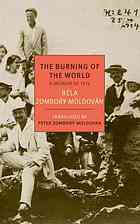
The Burning of the World
A Memoir of 1914
کتاب های مرتبط
- اطلاعات
- نقد و بررسی
- دیدگاه کاربران
نقد و بررسی

July 1, 2014
A recently discovered manuscript by a Hungarian artist provides detailed memories of World War I, close to the ground and close to the front.Edited and translated by the author's grandson, this memoir-likely never intended for publication-covers eight months that would shatter, topple and transform the world of the 29-year-old artist in a country to which he returned home a stranger. It begins with him on vacation with friends, an idyll interrupted by the news that war has been declared and he has been conscripted into the army. "There had been no war in Hungary for almost seventy years," writes the author. "This was the twentieth century! Europe at equilibrium in the era of enlightenment and democratic humanism. It seemed impossible that a dispute should be decided by fighting." Though he declared war was "an anachronism," it is the belief that the era of warfare was over that now seems quaint, and the soldier soon found himself in the midst of the unthinkable violence of the war. Badly wounded three months into his service, he was sent to the hospital and then home, a changed man in a world he no longer understood and where he could never again feel at home. "[S]uffering and the fear of death-indeed, death itself-look different from the perspective of the hinterland than they do to someone taking part," he writes. Eventually, the author attempted to resume his life and return to his art among people who did not share his life-changing experiences. "I just wanted, like a humble little brook, to join in the great swelling flow of life," yet, as his account suggests, neither he nor his art could ever be the same again.A personal footnote to the war's exhaustive history that makes that history come alive.
COPYRIGHT(2014) Kirkus Reviews, ALL RIGHTS RESERVED.

July 1, 2014
Zombory-Moldovan (1885-1967), a Hungarian painter, was 29 years old and vacationing at the seaside when he learned that the Austro-Hungarian empire had entered the "War to End All Wars," and he had been called to serve in the Hungarian defense forces. The slim volume covers the eight months from the time Zombory-Moldovan learned of the war to when he returned from his convalescence, and describes the hopeless conditions the troops faced: poor training, shoddy weapons, and impractical regulations. The writing detailing the author's experiences in battle has an energy and a sense of urgency, and the whole book is filled with the understanding that life would never be the same again. While many World War I veterans wrote memoirs of their life in combat, this one is different for two reasons. First, most accounts tell of war on the western front but this story is about life on the eastern front. Second, the book was translated and published almost 100 years after the beginning of the war--planned as a part of a larger work recounting the painter's life. The material was passed along to several generations of family before the author's grandson translated and published it. VERDICT This book is recommended for anyone interested in World War I, war memoirs, and the history of eastern Europe.--Jason Martin, Stetson Univ. Lib., DeLand, FL
Copyright 2014 Library Journal, LLC Used with permission.

Starred review from July 1, 2014
During this, the centennial of the outbreak of WWI, there is bound to be a steady flow of historical tracts and a revisiting of memoirs of the seminal conflict. This haunting, heartbreaking, and beautifully written memoir should stand above most. Zombory-Moldovan was a young Hungarian painter and graphic artist drafted into the Austro-Hungarian army. He was wounded while serving on the Russian front and spent most of the war in a noncombatant role. Still, his relatively short exposure to combat is conveyed with an unforgettable intensity. But this is not another chronicle of trench warfare. On the eastern front, the conflict was a war of maneuver and mobility, and Zombory-Moldovan stresses the constant movement of the lines of the opposing armies and the confusion magnified by the constant sound of artillery and machine-gun fire. Unlike many recounters of war on the western front, Zombory-Moldovan sees little soldierly comradeship. His was a polyglot army composed of the myriad ethnic groups of the Austro-Hungarian Empire, who often were unable to communicate with each other. What they shared was confusion about the purpose and horror at the savage consequences of the war. This is a deeply moving account of a young man's short but terrible plunge into an inferno.(Reprinted with permission of Booklist, copyright 2014, American Library Association.)

























دیدگاه کاربران